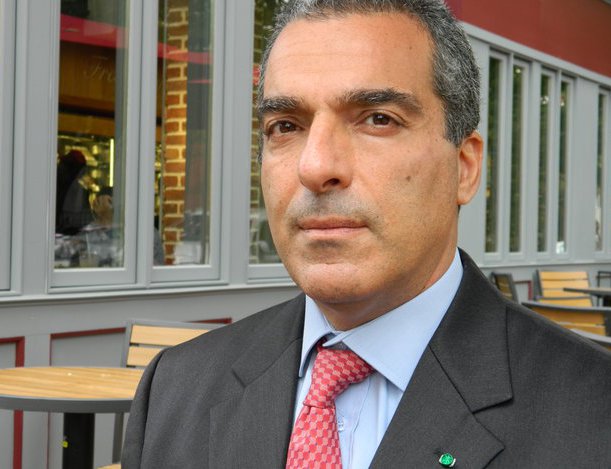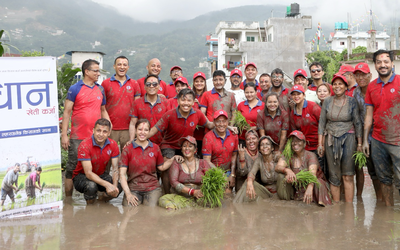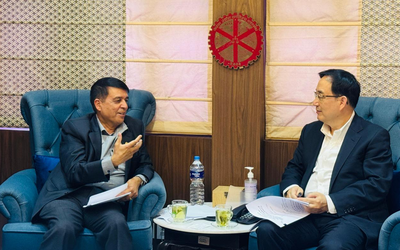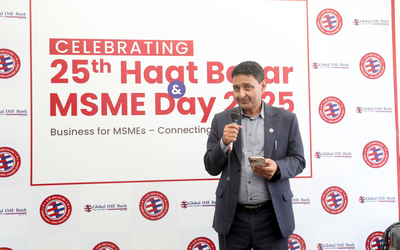
Ambassador Gideon Behar, Israel's Special Envoy for Climate Change and Sustainability, said that Israel can share a lot of experiences and technology with the world develops to mitigate climate change including Middle East.
He said that the climate change is an excellent opportunity to build regional collaboration that will enable the expansion of economic activity and create a platform for regional integration in Middle-East. He said that the recent Abraham Accords significantly increase this possibility.
Ambassador Behar said, “Climate change is therefore an excellent opportunity to build regional collaborations that will enable the expansion of economic activity and create a platform for regional integration. He also said that Israel is promoting vehicles run through renewable energy. He said that Israel will drastically reduce the burning of petroleum products and Israel is building a separate road lane for clean vehicles.
Addressing a virtual briefing organized by the Ministry of Foreign Affairs of Israel, on the topic of " Israel - A Country at the Forefront of Climate Innovation" ambassador Behar said that climate change will have a greater impacts in the middle east region. He said that the CO2 emission need to reduce to bring down the temperature as agree on Paris Summit.
Participated by the journalists from different parts of the world, ambassador Behar, an expert in the field of climate change and international relations, said that Israel is one of the world’s leading countries in the field of climate innovation, and can be a leading international force in the provision of answers and solutions to the climate crisis.
“The world is experiencing a growing need for practical solutions to the climate crisis: in both the mitigation of greenhouse gas emissions, and adaption and resilience building in areas such as agriculture, water, and food security. These needs are critical for humanity to prosper and survive in the growing and expanding conditions of climate change and acute environmental crisis. This could be Israel’s biggest contribution to the cause of building a better world, ” said ambassador Gideon.
Behar, a career diplomat with the Ministry of Foreign Affairs since 1994, has occupied many posts, among them Head of the Bureau for Africa; Special Envoy for African Affairs; Director of the Department for Holocaust Remembrance and Combating Antisemitism; Ambassador to Senegal; Deputy Director of the Jordan, Syria and Lebanon Department; and Deputy Head of Israel's diplomatic mission in Tunisia, He highlighted how country can reduce the water in irrigating land using drip irrigation technology.
“Israeli agriculture, renowned across the world, canprovide a significant part of the necessary solutions for feeding the world, whose population is constantly growing, and whose food supply has simultaneously become increasingly threatened by climate change, water shortages, and desertification. Precision agriculture, drip irrigation, hydroponic agriculture, greenhouses, the development of disease-resistant strains, the rehabilitation of soils that have undergone erosion and salination processes, streamlining efficiency in water use in agriculture, the use of brackish water, and more, are excellent examples of this. To these we should add the storage of agricultural products, post-harvest care, and streamlining of agricultural production – they can all prevent food loss, and as such, reduce greenhouse gas emissions,” said ambassador Behar, who teaches a university course on The Impacts of Climate Change on International Relations' and publishes regularly in the press on such topics as climate change and the environment.
Highlights of His Briefing
Another excellent example of this is the method developed by the Volcani Center that reduces the loss of grains stored in "silo" containers to just half a percent. This is seemingly a world record, and indeed in the world as a whole, up to dozens of percent of grains in storage are lost as a result of disease, mold, and insects. An extraordinary amount of greenhouse gases, water, and agricultural lands could be saved if the loss rate of grains in storage across the worldwas just half a percent. Global food security would strengthen greatly. And the researchers at the Volcani Centerand other research centers and universities in Israel do not rest, and are engaging in a variety of research projects whose focus is the climate and agricultural crisis.
This field is critical to our existence as a species and for the prevention of wide-scale disasters. Simultaneous to processes of climate change, desertification, and the ruin of the natural environment –all of which harm the capacity of humankind to produce its food – processes of population growth, and an increase in demand for crops for industrial needs and alternative fuel resources, are also occurring. The United Nations Food and Agriculture Organization (FAO) estimates that an increase in agricultural production of some 70% by 2050 will be required in order to meet the needsof food and industry. The combination of all of this together puts great strain on natural systems and gravely jeopardizes their ability to exist and to continue to supply system services to both humankind and to nature. Therefore, when we understand that there isn’t any more new land for farming and that we must preserve the forests and open lands we have, the only solution will be to streamline growing methods and prevent the loss of agricultural products. Israel is one of the world’s leading nations in the streamlining of agricultural production, post-harvest care, and storage.
Water is another area where Israel is leading the world, and if we could better share Israel’s experience and capabilities, we would be able to bring relief to many of the world’s misfortunes. In water purification and recycling and water desalination, Israel is a global power, holding a global record – close to 90% of its wastewater is purified and recycled for use in agriculture. If this was the recycling rate in the entire world, it would massively reduce the amount of greenhouse gases, prevent environmental pollution and the destruction of natural ecosystems, and simultaneously provide treated and purified water for the environment and for use in agriculture. It would be possible to reduce massive greenhouse gas emissions, build agricultural resilience against the climate crisis, allow more water in the natural environment to remain within the ecosystems that routinely absorb greenhouse gases, prevent unnecessary destruction of ecosystems as a result of pollution or water shortages, and more – all at the same time.
Another area where Israel holds a global record is in the prevention of water loss in urban systems. Where in Israel just a few percent of water is lost in urban supply systems, in other countries in the world it can be as much as dozens of percent. The paradox is that, sometimes, they are arid and water-thirsty countries significantly burdened by water shortages. In Israel, a wide variety of technologies and methods to prevent water loss in supply systems have been developed – the detection of liquids through remote systems and more – that, if widely implemented across the world, would significantly contribute to reducing the effects of the climate crisis.
In the reforestation of semi-arid regions, Israel also has much to contribute to the world. More than a century of reforestation has given Israel invaluable experience, data, and understanding of how to plant and preserve forests in semi-arid and low-precipitation areas. As the discourse increasingly focuses on nature-based solutions to the climate crisis and plans for tree-planting on a mass scale – billions of trees are planted every year to mitigate the effects of the climate crisis – tiny Israel likely has a lot to offer in the field. We emphasize that we are speaking of reforestation, and not afforestation (new forests), which comes at the expense of natural functioning ecosystems and local trees according to all the accepted norms of sustainability.
Israel also has experience and advanced technologies to offer in the field of renewable energy. Israeli companies offer groundbreaking solutions in energy efficiency and energy storage solutions. Noteworthy are the development of technologies that streamline the solar energy production process, the development of energy storage technologiesbased on air compression or on the storage of energy in ice, and more. These developments make redundant the use of batteries that need to be recycled at the end of their life cycles, not to mention the financial and environmental costs associated with their production. In the development of renewable energies, there are a number of innovative Israeli developments, such as energy production through the power of waves. Apps that monitor energy usage in your home, helping consumers become more energy efficient and save electricity, and even electric roads that supply energy to the vehicles travelling on them, are all also noteworthy.
Other companies and academic research institutes are pioneering the development of substitutes for animal protein, whether it’s cultured meat grown in lab conditions, plant protein that mimics meat or chicken at the highest level, or proteins produced through fermentation. Knowing the significance of the food industry’s role in the climate crisis – while the world simultaneously expects its consumption of meat and animal products to increase significantly–developments such as these can significantly contribute to finding solutions to the climate crisis. The coronavirus pandemic has given a significant boost to companies operating in this field due to the damage to meat production experienced in some companies in the worldand increased global awareness of the relationship that exists between zoonotic disease outbreaks, damage to the natural environment, and the extensive expansion of large-scale livestock farms.The market for animal protein substitutes is growing exponentially, and it’s fitting that we encourage it in order to reduce the pressure we place on nature.
Other developments from the worlds of innovation, app development, AI, materials recycling, the increasing use of more energy-efficient materials in industry, and more – which can and should be embraced in addressing the climate crisis – are also noteworthy. Israel is well-placed to contribute significantly to the field of climate innovation, and should maximize its capabilities in this area for the benefit of the entire world.
One of the key emphases in world taking shape before us today is on the development of technologies and applicable scientific research. It’s become clear to countries around the world that they must, on one hand, invest nationally in this field, and on the other hand, build global collaborations. Israel, despite all of its innovation, must also build international collaborations. Given this context, the climate crisis represents a real opportunity to establish such collaborations, and it is important that they be included in any economic, scientific, environmental, and business plan. Given the fact that Israel is a highly technologically advanced country but geographically smalland a small economy in itself, this international cooperation is particularly important.
Regional cooperation with our neighbors in the Middle East is another important realm of opportunities in the field of climate innovation in all of the areas discussed, all of which are of equal importance to the countries of the region. Such cooperation is critical to their prosperityand to the need to prevent the effects of the climate crisis, which will prove particularly dramatic and severe for the Middle East. This kind of cooperation will also enable the transfer of renewable energy and water. In the absence of regional cooperation, it is expected that the region’s countries will have to face the heavy burden of climate change alone and with only partial success. Climate change is therefore an excellent opportunity to build regional collaborations that will enable the expansion of economic activity and create a platform for regional integration. The recent Abraham Accords significantly increase this possibility.
In the field of international aid (MASHAV), Israel also has much to contribute with regards to climate change. The coronavirus pandemic, widespread deterioration in global food security, the increasing shortage of drinking and agricultural water,and more,are being felt across the countries of the developing world. Their ability to function is becoming increasingly tied to a climate crisis over which they have little influence. The primary strategy for them is therefore adaptation and the building of resilience. In all of these areas, Israel has more to offer them than many other countries in the world. Developed countries and the various UN bodies that understand the possible consequences of climate change in developing countriesmay make good use of Israel’s technologies and experience in resilience-building. MASHAV, Israel’s international aid agency located within the Foreign Ministry, is particularly experienced in this area. This assistance also has the potential to advance cooperation with other important donor countries. As such, it will also foster mutual learning and knowledge transfer, and strengthen political and economic relations among donor and developing countries.
Sustainability and climate change are also topics for new and stimulating dialogue with Jewish communities around the world. This is afield which can and should invite young Jews to identify and cooperate with Israeland to work jointly in the world’s developing countries. The synergy that this will create will strengthen global efforts to address the climate crisis.
To conclude, Israel can be a leading actor in the world in the provision of solutions to the climate crisis, both in adaptation and resilience as well as in the mitigation of emissions. At the regional level, Israel can invest its efforts towards building regional cooperation, reducing risk, and maximizing benefits for the countries of the region. The Abraham Accords have undoubtedly made a significant contribution to this.
- Supreme Court upholds appointment of 52 officials
- Jul 03, 2025
- Weather Forecast: Generally Cloudy In The Hilly Areas With Heavy Rainfall In Some Areas Of Bagmati And Koshi Province
- Jul 03, 2025
- MCA-Nepal Welcomes Continued U.S. Support for MCC Nepal Compact Implementation
- Jul 02, 2025
- Sutlej to sell electricity from Arun III to Uttar Pradesh
- Jul 02, 2025
- PHDCCI India-Nepal Centre Organises “India-Nepal Fintech Summit 2025” In New Delhi
- Jul 02, 2025















